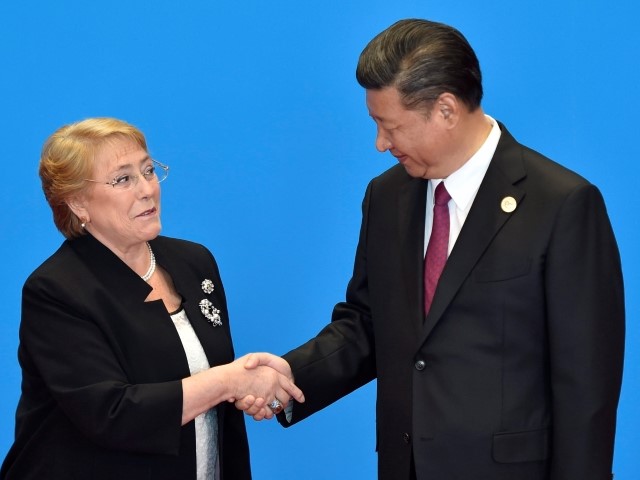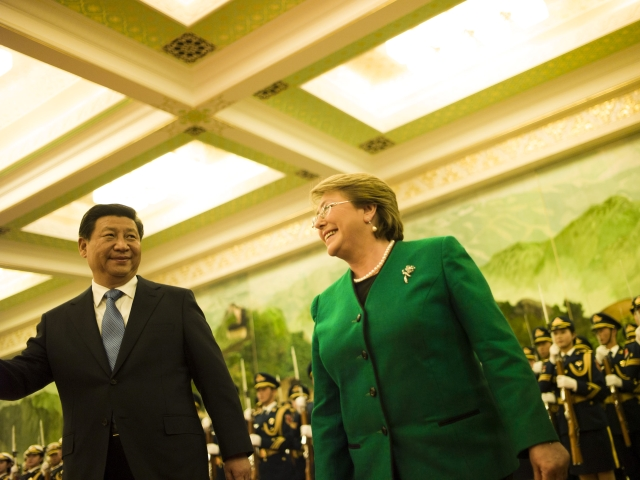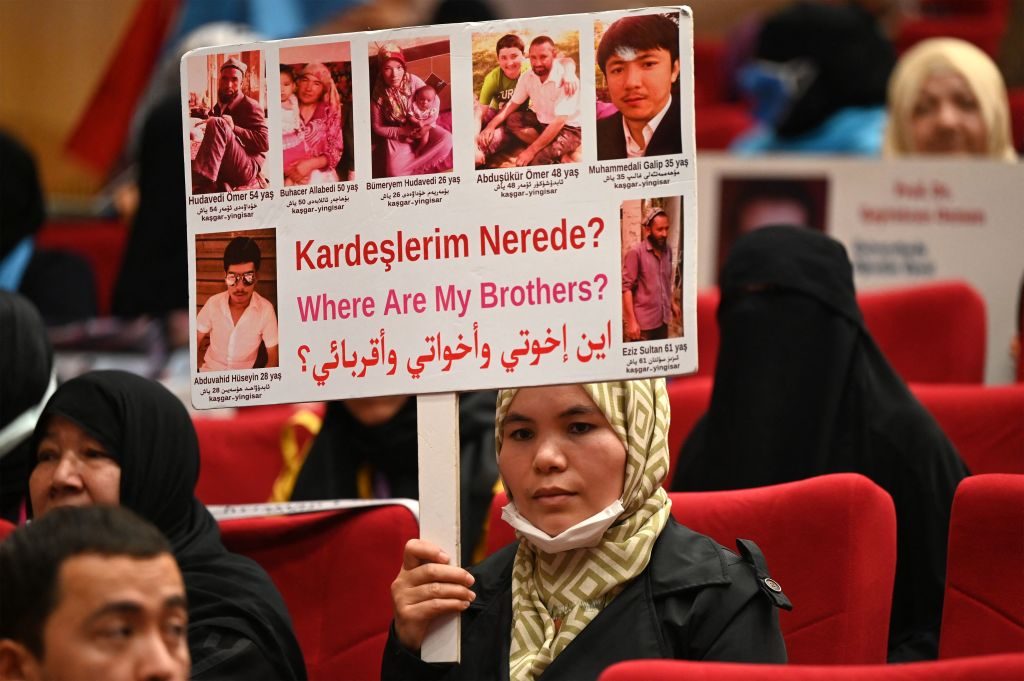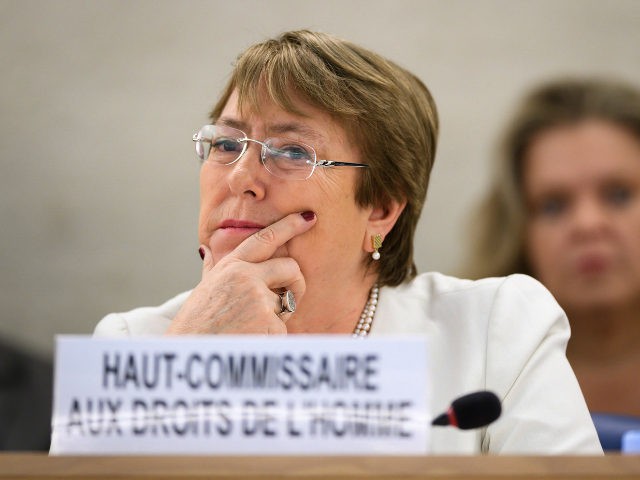Chinese state media on Sunday applauded U.N. High Commissioner for Human Rights Michelle Bachelet for failing to investigate China’s human rights abuses in the Uyghur region China calls Xinjiang during her visit.
The Chinese Communist Party was delighted that Bachelet decided to play along with her minders and refrained from commenting on the genocide of the Uyghur Muslims. Human rights activists and Uyghur refugees were considerably less pleased.
China’s state-run Global Times on Sunday gleefully reported that Bachelet focused on China’s “tremendous achievements” in reducing poverty, but said little about the Uyghurs beyond touting her “direct discussions with China’s most senior leaders on human rights.”
As far as the Global Times was concerned, Bachelet’s whitewash of the Uyghur genocide was a complete success, and her stage-managed visit proved that reports of concentration camps and forced labor are just “conspiracy theories”:
Regarding Xinjiang-related topics that have attracted much attention from the outside world, Bachelet visited Kashi, Urumqi and other places, walked into the cotton fields, and watched an exhibition on the theme of anti-terrorism and de-radicalization. During her Xinjiang visit, she also had discussions and exchanges with people from all walks of life such as ethnic minorities, experts and scholars. At the press conference, Bachelet specifically pointed out that her talks were conducted without supervision.
This development euphemistically responds to the conspiracy theories that have been deliberately created by US and Western public opinion for quite some time. Before Bachelet’s visit to China began, the US, the UK and other countries threw out “questions” based on the presumption of guilt, asserting that the high commissioner’s visit was “a mistake.” After Bachelet honestly and objectively told the press conference her experience and details of her stay in China, some stubborn Westerners still turned a blind eye to all this. The US State Department even takes the lead by expressing its “concerns” and its feeling of being “troubled,” and it accused China of restricting and manipulating Bachelet’s visit. It also put forward its previous tailor-made lies about Xinjiang region again.
The Global Times rambled on at length about how the tyranny in Beijing merely used rational and lawful techniques to “crack down on terrorist activities” in Xinjiang, which its inhabitants call East Turkistan, creating a happy province that is now “free of violent terrorism.”
“In recent years, the U.S.-led West made up the so-called missing person list, and by invoking the rhetoric of ‘concentration camps’ and other historical memories of the people of Western countries, they had forcibly imposed the labels of ‘genocide’ and ‘forced labor’ on Xinjiang,” the Global Times huffed. “The more exaggerated their lies, the easier they will be exposed. Actually, anyone who has been to Xinjiang can see the absurdity of the U.S. and the West in demonizing the region.”

File/Chile’s President Michelle Bachelet (L) shakes hands with Chinese President Xi Jinping during the welcome ceremony for the Belt and Road Forum, at the International Conference Center on May 15, 2017 in Yanqi Lake, north of Beijing, China. (Kenzaburo Fukuhara-Pool/Getty Images)
The Chinese Communist paper went even further and claimed Bachelet’s visit demonstrated China is superior to the free world in human rights, and her helpful comments have simply erased the testimony of all the Uyghur concentration camp survivors, all those satellite photos of massive camps strewn across Xinjiang. The editorial concluded by jeering at the notion anyone would take the word of a few mutilated Uyghurs over that of the U.N. human rights chief.
Bachelet’s statement as she departed China was weak and excessively deferential to her Chinese hosts, but it was not quite the full-throated endorsement of Xinjiang as a cheery post-Wicked Witch Munchkinland that Chinese propagandists are claiming.
For one thing, Bachelet clearly stated her visit was not an “investigation” and should not be portrayed as such. She said her primary goal was to have meetings with Chinese officials and express the concerns of the U.N. Human Rights Commission.
“Official visits by a High Commissioner are by their nature high-profile and simply not conducive to the kind of detailed, methodical, discreet work of an investigative nature,” she noted.
As the Global Times reported, Bachelet did effusively praise China for reducing extreme poverty and making progress on “gender equality.”

File/Chilean President Michelle Bachelet (R) and Chinese President Xi Jinping inspect Chinese paramilitaries at the Great Hall of the People on November 12, 2014 in Beijing, China. (Fred Dufour-Pool/Getty Images)
Bachelet also bizarrely praised the world’s worst polluter for making strides toward “sustainable development” and celebrated reforms in the Chinese judicial system, which is a totalitarian nightmare of black-bag abductions, closed-door trials, and lengthy prison sentences for absurd charges like “picking quarrels and starting trouble.”
When she talked about Xinjiang, however, Bachelet clearly stated there were human rights problems in the region. Her criticism was far more muted than human rights groups and Uyghur activists were hoping for, but it was criticism:
In the Xinjiang Uyghur Autonomous Region, I have raised questions and concerns about the application of counter-terrorism and de-radicalization measures and their broad application – particularly their impact on the rights of Uyghurs and other predominantly Muslim minorities. While I am unable to assess the full scale of the VETCs, I raised with the Government the lack of independent judicial oversight of the operation of the program, the reliance by law enforcement officials on 15 indicators to determine tendencies towards violent extremism, allegations of the use of force and ill treatment in institutions, and reports of unduly severe restrictions on legitimate religious practices. During my visit, the Government assured me that the VETC system has been dismantled. I encouraged the Government to undertake a review of all counter terrorism and deradicalization policies to ensure they fully comply with international human rights standards, and in particular that they are not applied in an arbitrary and discriminatory way.
Before coming to China, I heard from some Uyghur families now living abroad who have lost contact with their loved ones. In my discussions with the authorities, I appealed to them to take measures to provide information to families as a matter of priority.
I also share the concerns of UN human rights mechanisms about legitimate activities by lawyers, human rights defenders and others being penalized under the national security framework. UN human rights bodies have found the system of Residential Surveillance constitutes arbitrary detention and have called for its repeal.
Bachelet was also mildly critical of China’s brutalization of Tibet and its crackdown on political speech and freedom in Hong Kong. Her criticism mostly consisted of urging China to respect the Tibetan “cultural identity” and Hong Kong “civil society” that Beijing is deliberately destroying.
World Uyghur Congress President Dolkun Isa said on Saturday that Bachelet “wasted a historic opportunity to investigate the Uyghur genocide and deliver justice to the Uyghur people.”
“The High Commissioner has ruined her office’s credibility by aligning with China’s wishes and conducting a visit that by no means adequately addressed justice for Uyghurs and accountability for those responsible,” Isa said.

Members of Muslim Uyghur minority present pictures of their relatives detained in China during a press conference in Istanbul, on May 10, 2022. (OZAN KOSE/AFP via Getty Images)
Adrian Zenz of the Victims of Communism Memorial Foundation, which released a bombshell trove of incriminating data from Xinjiang police just as Bachelet was arriving in China, said her visit was even “worse than what had been feared” by human rights activists.
“The perhaps worst human rights violation of our time is treated as a matter of internal review by the perpetrator,” Zenz said, noting Bachelet was only allowed to see sanitized and decommissioned facilities in Xinjiang, and she spoke mostly with the Chinese officials who ran them, not the Uyghurs who were imprisoned there.
U.S. Secretary of State Antony Blinken said on Saturday that he was “troubled by reports that residents of Xinjiang were warned not to complain or speak openly about conditions in the region” during the U.N. commissioner’s visit.
“While we continue to raise our concerns about China’s human rights abuses directly with Beijing and support others who do so, we are concerned the conditions Beijing authorities imposed on the visit did not enable a complete and independent assessment of the human rights environment,” Blinken said.
“We again call on the PRC to immediately cease its atrocities in Xinjiang release those unjustly detained, account for those disappeared, and allow independent investigators unhindered access to Xinjiang, Tibet, and across China,” he said.

COMMENTS
Please let us know if you're having issues with commenting.